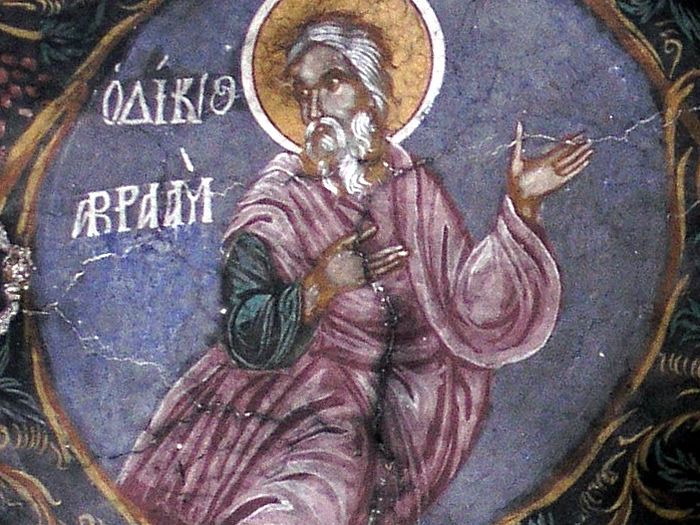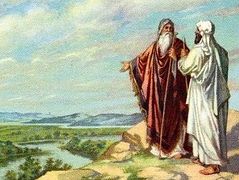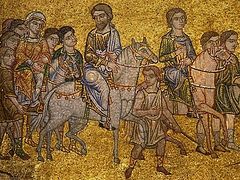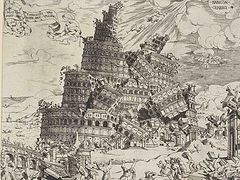Talk 10. The Temptation of Wealth, or How Not to Wind Up in Sodom and Gomorrah
In our previous talk on the Book of Genesis, we saw how there was a dispute in the family of Abram, between his shepherds and those of his nephew Lot in chapter 13.
Abram acts wisely and resolves the conflict, giving Lot the right to choose land for his livestock. Lot doesn’t consult with Abram, who, in fact, is not only his uncle, but also a patriarch, and chooses the best pastures, which bordered on Sodom and Gomorrah, and as a result is captured along with the Sodomites.
The fourteenth chapter tells us about the battle between the pagan kings and Sodom and Gomorrah and their allies, in which the pagan kings gained an easy victory over these cities and their forces, revealing the inability of those who had, as they say today, a “non-traditional orientation,” to repel attacks and defend themselves and their homeland. This is how these events are described:
With Chedorlaomer the king of Elam, and with Tidal king of nations, and Amraphel king of Shinar, and Arioch king of Ellasar; four kings with five. And the vale of Siddim was full of slimepits; and the kings of Sodom and Gomorrah fled, and fell there; and they that remained fled to the mountain. And they took all the goods of Sodom and Gomorrah, and all their victuals, and went their way. And they took Lot, Abram's brother's son, who dwelt in Sodom, and his goods, and departed. And there came one that had escaped, and told Abram the Hebrew; for he dwelt in the plain of Mamre the Amorite, brother of Eshcol, and brother of Aner: and these were confederate with Abram. And when Abram heard that his brother was taken captive, he armed his trained servants, born in his own house, three hundred and eighteen, and pursued them unto Dan. And he divided himself against them, he and his servants, by night, and smote them, and pursued them unto Hobah, which is on the left hand of Damascus. And he brought back all the goods, and also brought again his brother Lot, and his goods, and the women also, and the people (Gen. 14:9-16).
St. John Chrysostom notes: “It would have been much better for him (Lot) to live with the righteous man than to be separated from him and experience so many calamities. Here he separated himself from the Patriarch, thinking to enjoy greater freedom, to own better places, to live very richly—and suddenly he became a prisoner, homeless, deprived of shelter, so that you would know what evil discord is, and what good harmony is, and that it’s better not to chase after more, but to love abasement.” This is called, without commentary, a lesson for those seeking an illusory freedom out of Church communion.
Abram learns that Lot, his kinsmen, is in captivity, and seeks to help him, to release him from captivity. Do we do the same when we learn of the plight of our relatives, that they are living in a distant land in terms of their relationship to God and the Church? What hinders us from freeing them and telling them about the path to the Kingdom of Christ? Perhaps it’s our own lack of faith and semi-Christian life, our captive soul with its unrepentant sins, that manifests our cowardice in general. St. Ambrose of Milan writes the following about this:
How harmful are the vices that are combined with frivolity. For the four kings who were victorious over the five kings and carried off all the cavalry of the Sodomites also captured Lot, the son of the brother of Abram, and departed. The five kings are the five bodily senses: sight, hearing, smell, taste, and touch. The four kings are worldly seductions, because human flesh is made up of four elements. Justly they are called kings, because sin has its supreme power; it has its kingdom. Therefore the Apostle says: Let not sin therefore reign in your mortal body (Rom. 6:12). So, our senses easily yield to worldly pleasures and are taken captive by their power. For the bodily pleasures and seductions of this age are conquered only by the mind, which is spiritual, that is devoted to God and completely separated from that which is earthly—for every deviation is taken captive by the mind.
What an important remark and rebuke to all the people of this age who live by their senses. St. Seraphim of Sarov warned about the danger in the Christian life of being led by the senses, which aren’t taught by the skill of the mind to distinguish between good and evil (Heb. 4:14). “One must stand,” the saint said, “with the mind in the heart.” But as for those who haven’t taken care to have God in their minds—God has given them up to a perverse mind—to work lasciviousness, so that they are full of every kind of unrighteousness, lust, guile, covetousness, malice, full of envy, murder, strife, deceit, malevolence, calumniators, slanderers, God-haters, abusers, self-praise, pride, inventors of evil, disobedient to parents, reckless, treacherous, unloving, irreconcilable, unmerciful. They know the righteous judgment of God, that the workers of such deeds are worthy of death. But they not only do them, but approve of those who do them (Rom. 1:28-32). Not seeing all this baggage of sin within ourselves, and not repenting of it, we elevate ourselves above others. Our preaching has not the faith of Abram and the love of Christ for our neighbor; it is like the prayer of the pharisee: Lord, I thank thee, that I am not as other men are (Lk. 18:11). In this sense, the captive is incapable of freeing the captive, and the light of Christ fades in the words and life of the Christian.
And, as we read further on, Abram arms himself and takes the best people—few in number, but the best, and rescues Lot and all his relatives from captivity.
“After all,” continues St. Ambrose, “he received those whom he deemed worthy of being counted among the faithful… Thus, Abram was victorious because he merited it by faith, not by a large army.” By faith, not by a large army. What important words, genuine spiritual guidance in the work of personal missionary service and in the mission of the Church as a whole, with its spiritual, educational, and enlightening ministry: not to pursue quantity in these matters, but to strive for quality.
I’m thinking about the quality of teaching and learning in our theological schools: the education and training of pastors, missionaries, and catechists who can go out into the field to preach to this world about Christ, who can free our fellow countrymen, most of whom are baptized, and are therefore also of the Christian race—brothers and sisters in Christ, but captive to the service of sin.
The fourteenth chapter goes on to describe the meeting of Abram with two kings. There is Melchizedek, who brings him bread and wine—a prototype of the Eucharist—and Abram, in turn, brings him a tithe of his property (this event will be discussed in more detail in the next conversation). But from the king of Sodom, who offers him his wealth, Abram takes nothing. He doesn’t want to have anything in common with this man, even in small things, knowing his depravity. But Abram told the king of Sodom: I have lift up mine hand unto the Lord, the Most High God, the possessor of Heaven and earth, That I will not take from a thread even to a shoelatchet, and that I will not take any thing that is thine, lest thou shouldest say, I have made Abram rich (Gen. 14:22-23).
Archimandrite Vasileios, the former abbot of Iveron Monastery on Mt. Athos, writes in one of his letters about perhaps the most important mistake that penetrates our theological schools:
It is impossible to simultaneously maintain worldly governance in the Church and proclaim spiritual teachings orally and in writing, because in this case, all our preaching will be robbed of its power, losing its spiritual qualities and its very essence. The Church is not an organization of “pious people,” having liturgical means for the spiritual needs of the faithful or theology for solving metaphysical problems and enigmas. The Church is the tabernacle of God with men (Rev. 21:3). It’s a small flock, and at the same time, “more spacious than the heavens.” It is encompassed by nothing, but itself encompasses history and creation.
In this sense, theological schools are not the sophistic Areopagus, and theology is not a field of philosophy with room for hypotheses, systems, and theories, where anyone can say anything he wants and defend any point of view. Orthodox theology does not put forth any hypotheses, but testifies. Theology is not a confrontation of reasonings and arguments in search of truth, but confession. Abram was a true confessor and man of faith. Faith is not an abstract personal understanding of God; it has its content and fullness in the teaching of the Church. Such a precise confession of faith begat love for God in Abram and made him able to free others from their captivity to vices and passions by his love for them. Above all, in our own Christian life, let us strive to imitate Abram in this service to God and man and remember the words of the Apostle Paul: And be not conformed to this world: but be ye transformed by the renewing of your mind, that ye may prove what is that good, and acceptable, and perfect, will of God (Rom. 12:2).





